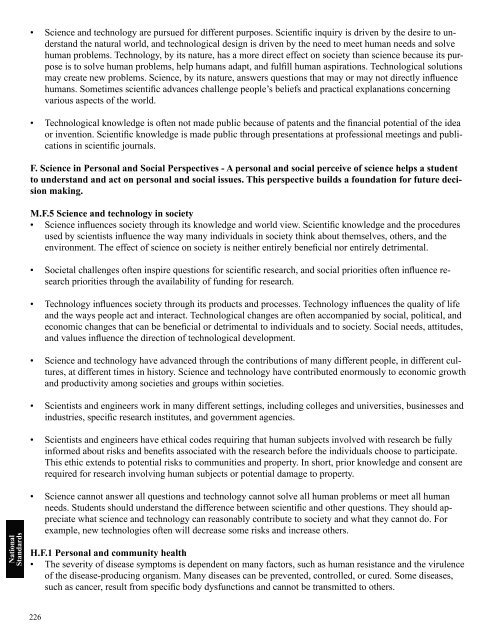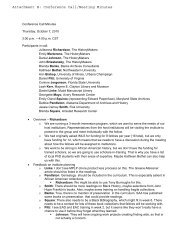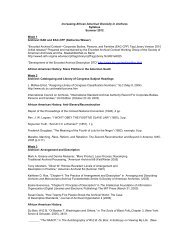ScienceMakers Toolkit Manual - The History Makers
ScienceMakers Toolkit Manual - The History Makers
ScienceMakers Toolkit Manual - The History Makers
You also want an ePaper? Increase the reach of your titles
YUMPU automatically turns print PDFs into web optimized ePapers that Google loves.
National<br />
Standards<br />
• Science and technology are pursued for different purposes. Scientifi c inquiry is driven by the desire to understand<br />
the natural world, and technological design is driven by the need to meet human needs and solve<br />
human problems. Technology, by its nature, has a more direct effect on society than science because its purpose<br />
is to solve human problems, help humans adapt, and fulfi ll human aspirations. Technological solutions<br />
may create new problems. Science, by its nature, answers questions that may or may not directly infl uence<br />
humans. Sometimes scientifi c advances challenge people’s beliefs and practical explanations concerning<br />
various aspects of the world.<br />
• Technological knowledge is often not made public because of patents and the fi nancial potential of the idea<br />
or invention. Scientifi c knowledge is made public through presentations at professional meetings and publications<br />
in scientifi c journals.<br />
F. Science in Personal and Social Perspectives - A personal and social perceive of science helps a student<br />
to understand and act on personal and social issues. This perspective builds a foundation for future decision<br />
making.<br />
M.F.5 Science and technology in society<br />
• Science infl uences society through its knowledge and world view. Scientifi c knowledge and the procedures<br />
used by scientists infl uence the way many individuals in society think about themselves, others, and the<br />
environment. <strong>The</strong> effect of science on society is neither entirely benefi cial nor entirely detrimental.<br />
• Societal challenges often inspire questions for scientifi c research, and social priorities often infl uence research<br />
priorities through the availability of funding for research.<br />
• Technology infl uences society through its products and processes. Technology infl uences the quality of life<br />
and the ways people act and interact. Technological changes are often accompanied by social, political, and<br />
economic changes that can be benefi cial or detrimental to individuals and to society. Social needs, attitudes,<br />
and values infl uence the direction of technological development.<br />
• Science and technology have advanced through the contributions of many different people, in different cultures,<br />
at different times in history. Science and technology have contributed enormously to economic growth<br />
and productivity among societies and groups within societies.<br />
• Scientists and engineers work in many different settings, including colleges and universities, businesses and<br />
industries, specifi c research institutes, and government agencies.<br />
• Scientists and engineers have ethical codes requiring that human subjects involved with research be fully<br />
informed about risks and benefi ts associated with the research before the individuals choose to participate.<br />
This ethic extends to potential risks to communities and property. In short, prior knowledge and consent are<br />
required for research involving human subjects or potential damage to property.<br />
• Science cannot answer all questions and technology cannot solve all human problems or meet all human<br />
needs. Students should understand the difference between scientifi c and other questions. <strong>The</strong>y should appreciate<br />
what science and technology can reasonably contribute to society and what they cannot do. For<br />
example, new technologies often will decrease some risks and increase others.<br />
H.F.1 Personal and community health<br />
• <strong>The</strong> severity of disease symptoms is dependent on many factors, such as human resistance and the virulence<br />
of the disease-producing organism. Many diseases can be prevented, controlled, or cured. Some diseases,<br />
such as cancer, result from specifi c body dysfunctions and cannot be transmitted to others.<br />
226










